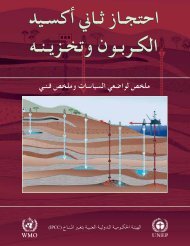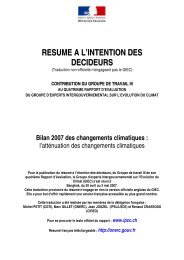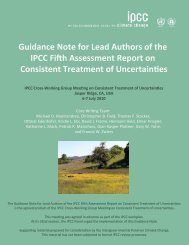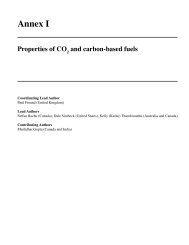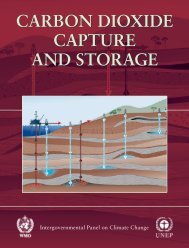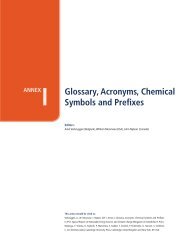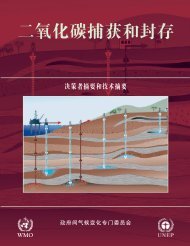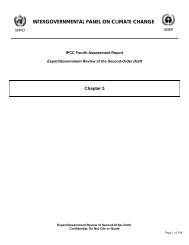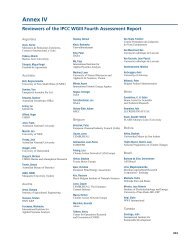SODBatch A&B SPM Comments co-chair response final ... - ipcc-wg3
SODBatch A&B SPM Comments co-chair response final ... - ipcc-wg3
SODBatch A&B SPM Comments co-chair response final ... - ipcc-wg3
You also want an ePaper? Increase the reach of your titles
YUMPU automatically turns print PDFs into web optimized ePapers that Google loves.
Chapter-<br />
Comment<br />
<strong>SPM</strong>-<br />
282<br />
<strong>SPM</strong>-<br />
283<br />
<strong>SPM</strong>-<br />
284<br />
para<br />
Batch<br />
From Page<br />
From Line<br />
To Page<br />
To line<br />
<strong>Comments</strong><br />
IPCC WGIII Fourth Assessment Report, Se<strong>co</strong>nd Order Draft<br />
warmer winters and tress weakened by recurrent droughts. The<br />
<strong>co</strong>mbination of climate factors and pests <strong>co</strong>uld produce non-linear<br />
changes in the scale of wildfires and forest losses. Burkett<br />
VR, Wil<strong>co</strong>x DA, Stottlemyer R, et al. Nonlinear dynamics in<br />
e<strong>co</strong>system <strong>response</strong> to climatic change: Case studies and policy<br />
implications. E<strong>co</strong>logical Complexity 2,357-394 (2005).<br />
Epstein, PR, Mills, E. (eds.). Climate Change Futures: Health,<br />
E<strong>co</strong>logical and E<strong>co</strong>nomic Dimensions, Center for Health and the<br />
Global Environment, Harvard medical School, Boston, MA<br />
[published with Swiss Re and the UNDP] (2005).<br />
Westerling, AL, Hidalgo, HG, Cayan, DR, Swetnam, TW. Climate<br />
change in the western United States has dramatically increased the<br />
number of large forest wild fires during the past 35 years. Science<br />
313:940943 (2006).<br />
(Paul Epstein, Harvard)<br />
3 A 4 7 4 8 I repeat a <strong>co</strong>mment on the FOD: Figure TS12 (which I re<strong>co</strong>mmend<br />
to move up to the <strong>SPM</strong>) does not support this statement, the range<br />
of post-TAR non-intervention CO2 emissions scenarios (incl. 5/95<br />
percen tiles) has narrowed <strong>co</strong>nsiderably. This does not suggest that<br />
we know more (although in line 18 of TS page 22 it is suggested<br />
for land-use emissions that experts agree more), but the statement<br />
as formulated is not <strong>co</strong>rrect. Reformulate, e.g. by something like:<br />
"post-TAR non-intervention GHG emissions scenarios all (or<br />
"generally"?) fall within the range of the SRES scenarios" or follow<br />
more closely the wording of the TS.<br />
(Rob Swart, MNP)<br />
3 A 4 7 4 9 This first sentence is very awkward. Maybe " The range of GHG<br />
emissions associated with a range of potential global futures<br />
(without….)" Also, need to clearly explain what the SRES are for<br />
those who don’t know.<br />
(Government of Environment Canada)<br />
3 A 4 8 0 0 The terms HM and HL are so subjective that they are useless. The<br />
people who are agreeing aren't specified and neither is "much" or<br />
"limited" evidence. This en<strong>co</strong>urages the idea that the interpretation<br />
Expert Review of Se<strong>co</strong>nd-Order-Draft<br />
Confidential, Do Not Cite or Quote<br />
Response suggested by <strong>co</strong><strong>chair</strong>s<br />
DISCUSS; problem with ch 3 is<br />
that is shows <strong>co</strong>mparisons with<br />
TAR and pre-TAR, while the<br />
appropriate <strong>co</strong>mparison is with<br />
SRES; so ch 3 has to change its<br />
analysis.<br />
Ch 3 will refer to SRES<br />
Action<br />
for<br />
chapter<br />
Considerations<br />
by the writing<br />
team<br />
3 ACC subject to<br />
checking and<br />
<strong>co</strong>ordination<br />
with Chapter 3<br />
(1)<br />
reject.<br />
Comparison<br />
made with<br />
SRES.<br />
(3)<br />
See A-277 See <strong>SPM</strong>-277<br />
(1)<br />
DISCUSS CG<br />
Uncertai<br />
nty<br />
Noted – see<br />
discussion CG<br />
(1)<br />
Page 70 of 348



